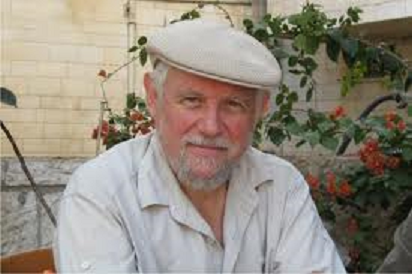
[EDITOR'S NOTE. My own concern with minimal forms of poetry & verbal composition goes back to the 1960s & discoveries I was making & creating in Techncians of the Sacred and Shaking the Pumpkin & connecting to experiments in our own time by poets like Ian Hamilton Finlay & others connected most specifically with what we were then speaking of as concrete poetry. That there was a complexity of thought & act behind this was another point I had to make – both “there” & “here” – & still that point seemed obvious enough. I called it, for Finlay & others, “a maximal poetry of minimal means,” & where I got into it myself, I found it helped to cool off, to set another temperature for what was otherwise my work.
It’s with thoughts like this in mind that I approach Seymour Maynes’s long-running project of what he calls & practices as “word sonnets.” In their one-word verticality I’ve found a strong resemblance too to the look & feel of Chinese poetry that led Ernest Fenellosa to see in the immediacy of the Chinese graphic/visual ideogram (set one per line) “a splendid flash of concrete poetry.” The following, then, is from Maynes's recent gathering, Ricochet (University of Ottawa Press), composed over a short period of time & conceived by him as a single & unified series.
Jerome Rothenberg
PREFACE
The word sonnet is a relatively new variation of the traditional form. In essence, it is a fourteen line poem, with one word set for each line. Concise and usually visual in effect, this “miniature” version can contain one or more sentences, as the articulation requires.
Each of the word sonnets in the following sequence attempts to be a pithy and suggestive poem in its own right. Many draw on the seasons and also aim for a compact resonance that may attract the reader to return to them again and again.
JANUARY
After
the
third
fall
even
the
traffic
trails
away
in
the
thick
sinking
snow.
VESSELS
I.
In
celebration
of
God's
domestic
air,
this
show
of
confetti
stills
the
festive
tongue.
II.
Flailing
foolscap
shreds
sheet
after
sheet,
each
torn
flake
flying
then
embedding
like
seed.
III.
Today's
snow
recycles
into
yesterday's
swollen
solar
pumpkin
and
next
season's
crowded
blueberry
bush.
LIGHT
Who
believes
in
light
everlasting,
enlightening
silence,
darkness
and
the
first
and
final
word?
EQUINOX
If
early
light
returns,
is
there
renewed
hope
for
ailing
tongues
rising
in
darkness?
HAIL
Hail
peppered
the
air
like
seed
as
you
were
lowered
below
the
frost
line.
STONE
You
have
come
and
gone
and
none
know
your
voice
or
name
but
stone.
CROWS
The
crows
of
Sandy
Hill
are
much
too
big,
sleek
with
wide
bristling
wings.
WIND
From
behind
the
maple
the
sun
flaps
its
blinding
plumage
without
a
waking
cry!
DUST
The
dust
of
afternoon
fragrance
settles
on
your
skin
and
limbs
grainy
with
touch.
PRACTICE RUN
What
is
this
sleep?
Practice?
I
put
up
my
feet
to
float
into
reverie.
SEPTEMBER RAIN
If
the
maple
trees
could,
they
would
dream
of
the
healing
entrance
of
May.
FROST
Cold
morning,
winter’s
reconnaissance
scouts
out
the
terrain
for
a
sortie
of
sudden
snow.
DECEMBER FLIGHT
These
starlings
swerve
in
flocks,
turning
their
frantic
wings
towards
the
sun’s
slanting
light.
Nota de Lisarda-Wiki
Seymour Mayne (born 18 May 1944 in Montreal, Quebec) is a Canadian poet and literary translator. He has published over 50 works of poetry and literary criticism, and has edited several anthologies of Canadian and Jewish literature.
He also published a critical analysis of poet Irving Layton's work in 1978.
Mayne currently teaches Canadian literatur at the University of Ottaw
Libros:
- That Monocycle the Moon (1964)
- Tiptoeing on the Mount (1965)
- From the Portals of Mouseholes (1966)
- Ticklish Ticlorice (1969)
- Anewd (1969)
- Mutetations (1969)
- manimals (1969)
- The gigole teaspoon (1969)
- Mouth (1970)
- For Stems of Light (1971)
- Face (1971)
- Cutting the Keys (1974)
- Name (1975)
- Begging (1977)
- Diasporas (1977)
- Irving Layton: The Poet and His Critics (1978)
- Racoon (sic) (1979)
- The Impossible Promised Land: Poems New and Selected (1981)
- Essential Words: An Anthology of Jewish Canadian Poetry (1985)
- Children of Abel (1986)
- Killing Time (1992)
- The Song of Moses (1995)
- Jerusalem: An Anthology of Jewish Canadian Poetry, ed. with B. Glen Rotchin (1996)
- Carbon Filter: Poems in Dedication (1999)
- A Rich Garland: Poems for A. M. Klein, ed. with B. Glen Rotchin (1999)
- Light Industry (2000)
- Hail (2002)
- Ricochet (2004)
- September Rain (2005)
- I Am Still the Boy
- A Dream of Birds, written with B. Glen Rotchin (2007)
- Ricochet, bilingual English-French collection of word sonnets, translated by Sabine Huynh (2011)
- The Old Blue Couch & Other Stories (2012)
María Laura Spoturno, investigadora del CONICET en el Instituto de Investigaciones en Humanidades y Ciencias Sociales (IdIHCS, CONICET – UNLP), en colaboración con estudiantes de la cátedra de Traducción Literaria I de la Facultad de Humanidades y Ciencias de la Educación de la Universidad Nacional de La Plata (UNLP).ha publicado en 2013 traducciones al español de la obra de Seymour Mayne
Seymour Maine y Leonard Cohen
Fuente: https://jacket2.org/commentary/seymour-mayne



